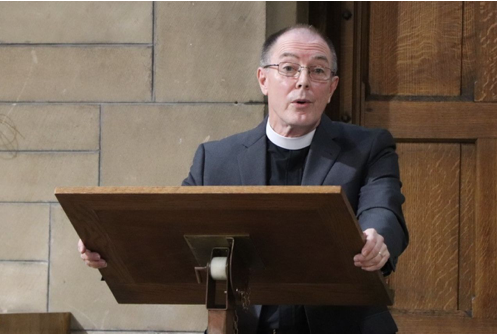Out of the mouths of babes
The Reverend Dr Michael Hull writes: As I steer my young children to and from school, shop, sport and, of course, church, they ask me about those who beg on the streets of Edinburgh. I do my best to explain. My explanations aren’t too shabby, for my wee ones demand I put something in every outstretched palm or cup. If I demur, I encounter their candour: ‘Daddy, you can’t forget them! You’re a priest!’ As the Psalmist says, and Jesus repeats, ‘Out of the mouths of babes and sucklings thou hast brought perfect praise’ (Psalm 8.2; Matthew 21.16).
A hazard of being a priest’s child is hearing lots of preaching about helping others, especially the poor, but seeing too little actual helping. It gives me pause that we Christians, myself more than anyone, so often fail to match words to deeds. Even more disturbing is when we mistake our words for deeds, that is when we deceive ourselves into thinking that we’re doing good when we’re telling others to do good.
Take the homeless crisis. More Christians and church leaders than I’m able to count are telling others what to do in terms of caring for the homeless. We are remarkably fond of telling the Government what it ought to do. Yet far too few of us have taken in a homeless person or contributed in any meaningful way of our own time, talent or treasure to solve the crisis. What’s even worse is that so many Christians these days publicly lament that no one seems to be listening to us about the homeless crisis — or about anything for that matter. Whether a church-manufactured metanarrative of a secular zeitgeist refusing to hear us, or a delusion of grandeur in terms of thinking ourselves speaking truth to power, it seems to me that no one is listening because, as St Paul reminds us, no matter how well we speak, if we have not love, we are sounding brass, clanging cymbals, empty noise (1 Corinthians 13.1). What sort of love? Well, Jesus tells us that it is the sort of love he not only taught but exemplified when he laid down his life for us: for you, for me, for everyone (John 15.12–13). It is love in action.
No one needs Christians to tell them what to do. Everyone needs Christians to show them what to do. We Christians would have much more influence in the twenty-first century public square if we had more good works than good words to support what we have to say.
Besides, the stakes for us Christians are much higher than being ignored or suffering derision in this world. It’s a matter of eternal life and death. Jesus tells us that at the Last Judgment there will be a separation between sheep and goats (Matthew 25.31–46). Jesus tells us that our places in the next world will have little to do with our bleating; our fates have to do with our behaviour. ‘Come, you blessed of my Father, inherit the kingdom prepared for you from the foundation of the world: for I was hungry and you gave me food; I was thirsty and you gave me drink; I was a stranger and you took me in.’
My children do no formal theological reflection about acting in persona Christi at the altar, but they sure do seem to understand when they say, ‘Daddy, you’re a priest!’, that talking in Jesus’s name should mean acting like Jesus, that being a priest, if it means anything at all, means being a Christian. Jesus did not pass by people who cried out for help as he walked the streets of first-century Jerusalem. There is a striking scene in St Luke’s gospel that casts in relief the meaning of love in action. St John the Baptist sends two of his disciples to enquire of Jesus if he is the Christ. Jesus doesn’t bleat an affirmation or get on a soap box. Instead, Jesus says, ‘Go and tell John the things you have seen and heard: the blind see, the lame walk, the lepers are cleansed, the deaf hear, the dead are raised, the poor have the gospel preached to them’ (Luke 7.22). In other words, if you want to know who I am, look at what I do, says Jesus.
Thank God for the candour of the young. Out of the mouths of babes God brings perfect praise. If we want to be Christians and if we want to share the Good News with others, the place to start is on the street by showing others and ourselves who we are by what we do, by putting something in every outstretched arm or cup, and by preaching with deeds rather than words to a world that needs love in action.

The Reverend Dr Michael Hull has been an Assistant Priest at St Vincent’s since 2015. He is also Director of Studies for the Scottish Episcopal Institute
